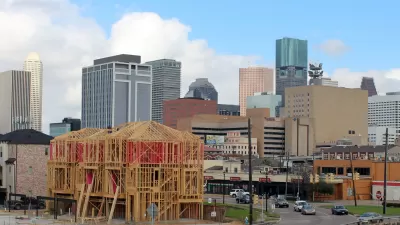A researcher at Rice University finds that proclamations of Houston’s affordability, gentrification, and growth are just myths.

Ryan Holeywell of The Urban Edge looks at a new report produced by Lester King, a Rice researcher and urban planner, where King challenges four common “myths” about the Houston’s gentrification, population growth, affordability, and development in the Inner Loop. Among the findings is that the city's reputation for housing affordability fails to take into account that pay for workers is often lower and transportation costs higher than other large cities around the US.
“When transportation costs are added to housing costs as a percentage of income, many areas along the periphery of the city also become less affordable,” King writes. That means housing is cheaper in Houston, but not necessarily more affordable…
Houston ranks 26th for affordability, according to data King cites from the Center for Neighborhood Technology. The average Houstonian spends 46 percent of his income on housing and transportation costs. “This conflicts with Houston’s marketability as the affordable capital of the country,” King writes in his report.
Lester also finds that the anticipated growth of the city – 3.5 million new residents by 2035 – assumes that all of those people will move inside the city limits, but current trends show that the new residents will be absorbed across the Houston-Galveston metro region (a much larger area). The assumption that Houston will be absorbing all of those people, King’s reports states, “may be indirectly eroding its affordability and middle class wealth base, since land values are increasing to meet the needs of 3.5 million people, who are in fact not moving here at all.”
FULL STORY: Here Are Four Myths About Houston’s Growth

Planetizen Federal Action Tracker
A weekly monitor of how Trump’s orders and actions are impacting planners and planning in America.

Maui's Vacation Rental Debate Turns Ugly
Verbal attacks, misinformation campaigns and fistfights plague a high-stakes debate to convert thousands of vacation rentals into long-term housing.

San Francisco Suspends Traffic Calming Amidst Record Deaths
Citing “a challenging fiscal landscape,” the city will cease the program on the heels of 42 traffic deaths, including 24 pedestrians.

Amtrak Rolls Out New Orleans to Alabama “Mardi Gras” Train
The new service will operate morning and evening departures between Mobile and New Orleans.

The Subversive Car-Free Guide to Trump's Great American Road Trip
Car-free ways to access Chicagoland’s best tourist attractions.

San Antonio and Austin are Fusing Into one Massive Megaregion
The region spanning the two central Texas cities is growing fast, posing challenges for local infrastructure and water supplies.
Urban Design for Planners 1: Software Tools
This six-course series explores essential urban design concepts using open source software and equips planners with the tools they need to participate fully in the urban design process.
Planning for Universal Design
Learn the tools for implementing Universal Design in planning regulations.
Heyer Gruel & Associates PA
JM Goldson LLC
Custer County Colorado
City of Camden Redevelopment Agency
City of Astoria
Transportation Research & Education Center (TREC) at Portland State University
Jefferson Parish Government
Camden Redevelopment Agency
City of Claremont





























